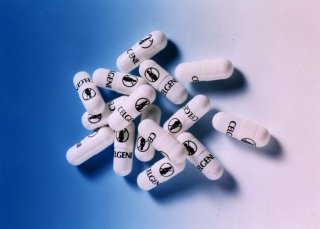
In the midst of the coronavirus pandemic, researchers have turned to existing medicines to see whether they can be repurposed to treat COVID-19.
Antiviral medicines such as remdesivir and favipiravir that prevent the virus from reproducing itself are amongst many medicines being tested. Some cough syrups are even being investigated.
And surprisingly, the drug thalidomide is also being tested as a potential treatment for COVID-19. Thalidomide infamously caused thousands of birth defects to babies who were exposed to the drug after their mothers took it to treat morning sickness between 1958-1962.
Despite its dark past, the drug has been repurposed in recent years, and is an approved treatment for multiple myeloma (a type of blood cell cancer) and complications of leprosy.
Thalidomide was originally used as a sedative, and was later found to also be useful for treating severe morning sickness in the 1950s and 1960s. Tragically its use resulted in severe and rare birth defects in children, particularly to the limbs, but also damaged many other parts of the body.
Yet thalidomide has many different effects within the body – which is why researchers are looking at it as a potential COVID-19 treatment. For example, it can inhibit the immune system’s inflammatory response, making it effective against inflammatory conditions, including leprosy. It can also inhibit new blood vessel formation, making thalidomide potentially effective against cancers. It is currently approved to treat multiple myeloma.
The drug can also protect the lungs, and has been effective in treating idiopathic pulmonary fibrosis. This is a life-threatening condition where the alveoli (which exchange oxygen and carbon dioxide molecules in the bloodstream) of the lungs are damaged, thickened and hardened, preventing them from working correctly. This leaves patients short of breath and with a persistent cough.
Thalidomide has been shown to reduce the persistent cough and reduce the lung damage, improving patient life quality. It appears able to do this by blocking the inflammatory response.
Thalidomide also appears to help relieve lung damage caused by the herbicide Paraquat. High doses of it can be toxic and result in lung inflammation, which causes scarring and reduced function. Animal studies suggest thalidomide can reduce the inflammatory response in lung tissue.
Thalidomide has been found to protect against lung infections caused by the H1N1 virus in mice. H1N1 caused the 2009 flu pandemic. The study found that thalidomide improves the chances of survival for mice infected with H1N1 by reducing the body’s inflammatory response.
Evidence shows thalidomide could protect the lungs by reducing the body’s inflammatory response, preventing damage of lung tissues and controlling the immune system. We know the coronavirus affects the lungs, causing pneumonia-like symptoms that result in inflammation, difficulty breathing and transporting oxygen around the body.
Several research groups wonder if thalidomide’s ability to protect the lungs against other diseases could make it a potential treatment for COVID-19. Repurposing this existing drug to treat a new condition also means the dosage and potential side effects are already known.
Remaining cautious
Preliminary evidence has found that using thalidomide in combination with glucocorticoids (which reduce immune response and inflammation pathways in the body) was able to successfully treat a patient suffering with pneumonia-like symptoms caused by COVID-19. However, this study is yet to be peer-reviewed.
A clinical trial is also underway to investigate if thalidomide could be used to treat moderate and severe COVID-19 induced pneumonia in China. Patients testing positive for COVID-19 will be given thalidomide or a placebo medicine. The placebo should have no effect on COVID-19 progression and will then be compared with the thalidomide-exposed patients. It will still be some time before researchers know whether thalidomide is effective in treating some COVID-19 patients.
However, thalidomide still has the ability to cause serious side effects. Thalidomide exposure during pregnancy can still harm the developing baby, something that happened recently in Brazil.
Clinical use of thalidomide can also cause many other side-effects which include peripheral neuropathy in patients. This causes damage to the nerves in the body’s extremities, causing pain. While such side-effects are usually associated with long-term use, any use of thalidomide needs to be carefully overseen by medical professionals.
Using thalidomide in the treatment of COVID-19 might also give researchers a better understanding of the drug’s effect in the body, and what other clinical conditions it could be useful for. Such work could also result, one day, in making safer forms of the drug that are an effective treatment without harmful side effects. However, it remains too early to determine its effectiveness in treating COVID-19.


No comments:
Post a Comment